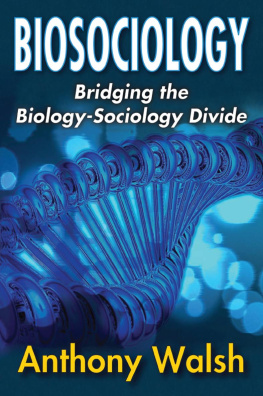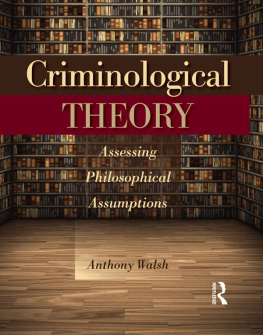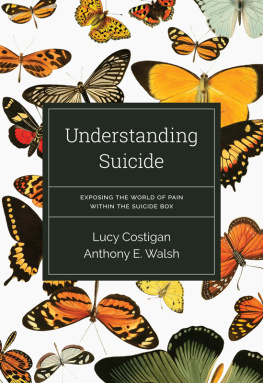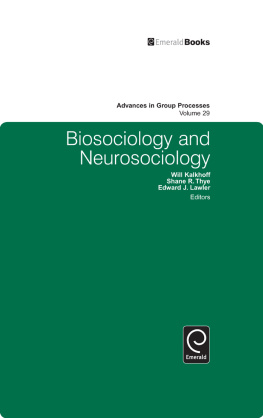First published 2014 by Transaction Publishers
Published 2017 by Routledge
2 Park Square, Milton Park, Abingdon, Oxon OX14 4RN
711 Third Avenue, New York, NY 10017, USA
Routledge is an imprint of the Taylor & Francis Group, an informa business
Copyright 2014 by Taylor & Francis.
All rights reserved. No part of this book may be reprinted or reproduced or utilised in any form or by any electronic, mechanical, or other means, now known or hereafter invented, including photocopying and recording, or in any information storage or retrieval system, without permission in writing from the publishers.
Notice:
Product or corporate names may be trademarks or registered trademarks, and are used only for identification and explanation without intent to infringe.
Library of Congress Catalog Number: 2013001978
Library of Congress Cataloging-in-Publication Data
Walsh, Anthony, 1941-Biosociology : bridging the biology-sociology divide / Anthony Walsh.
pages cm
Includes bibliographical references and index.
ISBN 978-1-4128-5256-2
1. Sociobiology. I. Title.
GN365.9.W35 2013
304.5dc23
2013001978
ISBN 13: 978-1-4128-5256-2 (hbk)
One might have thought, or at least hoped, that by now a book such as Anthony Walshs Biosociology no longer would be necessary. After all, fifty years have passed since William D. Hamilton formulated his theory of kin selection, as it came to be called, and its associated maximization principle. His contributionalong with, for example, Robert Triverss theories of reciprocal altruism and relative parental investmentrevolutionized the sciences of animal social behavior. The specification of these fundamental principles in conjunction with the expansion of evidence in fields such as behavioral ecology, endocrinology, evolutionary biology, genomics, neuroscience, and population genetics has profoundly altered our conception of what it means to be a social animal.
And yet, far too many sociologists remain blissfully inattentive to these and related developments and proceed to conduct their research and to teach their students as if human social behavior may be treated as somehow apart from the realm of nature. Instead, to a large extent, they remain implicitly wedded to presumably comforting notions such as the human mind as a blank slate, the fancifully peaceful conception of the noble savage, and the vacuous attributes of allegedly disembodied selves and symbols. These assumptionsrooted rather naively in the philosophical traditions of empiricism, romanticism, and dualismand the superficial analyses to which they give rise have been discussed and persuasively refuted by Steven Pinker in his delightful volume on The Blank Slate: The Modern Denial of Human Nature. In a related vein, these ideas are deeply embedded in what Leda Cosmides and John Tooby have described and so aptly critiqued as the standard social science model which, among other things, strives to assess human behavior as the exclusive product of socialization and cultural conditioning.
Of course, no one denies that environmental factors, including those emanating from the social and cultural environments, channel, constrain, and in various ways shape human social behavior. But, in light of the evidence generated in the evolutionary behavioral sciences, it is no longer tenable to claim that these sociocultural influences exert themselves on human organisms that are entirely malleable and thoroughly pliable. Instead, these environmental influences, which are real and significant, act on organisms that enter this world equipped with a fundamental human nature, with a set of behavioral dispositions proximately rooted in the design features of our central nervous and endocrine systems, organic traits that ultimately owe their existence to our species lengthy evolutionary history.
However much a significant number of sociologists may wish to deny the evident legitimacy of this claim, however much they may wish to dismiss its significance through either ignorance or misrepresentation, the history of sciencethe most insistently self-correcting system of knowledge developed to datesuggests that such efforts will most assuredly fail. There is no honor in prideful ignorance or wanton misrepresentation. One can no longer dismiss the evolutionary bases of human social behavior by reference to objections grounded in facile claims regarding determinism, essentialism, reductionism, and social Darwinism that are so frequently and erroneously slung about by sociologists who give thoughtful scholarship a bad name. Walsh devotes some attention to these errors. In doing so, he echoes the criticisms of others who have tried to banish these profoundly silly claims from the sociological literature. And yet, one does not have to delve too deeply into sociologys professional literature and textbooks to discover the persistence of such flagrant nonsense. That simple truths apparently still need to be stated is, in itself, a sad commentary on the current state of affairs in the discipline.
Lest I sound excessively pessimistic about the state of sociology today, I should hasten to add that, in recent years, some sociologists and other social scientists have made some degree of progress in forging closer ties to evolutionary biology. Interdisciplinary journals, such as Evolution & Human Behavior and Human Nature, have been launched and publish the results of fascinating research on human social behavior grounded in explicitly evolutionary principles.
Moreover, in sociologys own major journals, and I especially would single out Social Forces, one observes a slow but ever so steady increase in the publication of articles in which authors seriously engage the theoretical premises and empirical findings of the evolutionary behavioral sciences. Still another indicator of this positive drift may be found in the fact that a Section on Evolution, Biology, and Society has been established in the American Sociological Association (ASA).
These are encouraging signs, and they suggest that perhaps the day is not too distant when sociologys theoretical sophistication may match its methodological rigor and begin to fulfill its historical promise.
Truth be told, however, that day is only dimly dawning. And so, despite my opening remark, a book such as Biosociology is needed and adds itself to a slowly growing and increasingly influential body of literature in what may be called evolutionary sociology. For those, like me, who cling to the hope that sociology can be a genuinely scientific enterprise, Walsh offers insight into some of the ways that we may develop more productive linkages to kindred disciplines in the broader field of evolutionary biology. Others as well have been moving in this direction, and it is encouraging to see that Walsh remains committed to this emerging neo-Darwinian renaissance in the social sciences. This volume thus stands as a noteworthy contribution that, along with some others, offers solace to those of us who hope that, somewhere down the road, sociologists will manage to rid themselves of outmoded assumptions, to cast aside the self-destructive commitment to the vagaries of postmodernism, to recognize that ideological advocacy is a poor substitute for reasoned analysis and understanding, and to get on the with business of developing a genuine science of human social behavior.













